

Opinion: The mighty women of World War I. Some 100 years ago, a woman in Pittsburgh or St.
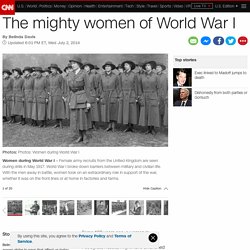
Denis in France or Petrograd, Russia, might have awakened at dawn, while her young children slept, to prepare for her first shift at a nearby munitions factory. Her husband, off fighting in World War I, had left her to test the limits of her own physical ability, as she provided food, shelter, warmth for her family, sometimes confronting great physical danger at work -- perhaps, for example, hanging suspended to load powerful explosives into the shells that other women had produced. When her work day was done, she went looking for food to buy, often standing in line for hours for scarce basic goods, scrounged for hard-to-come-by fuel to feed the furnace and cooked dinner. She washed the children, put them to bed, cleaned up and wrote a letter to her husband, keeping her worry off the page, before sleeping a few hours.
And then she got up and did it again. World War I Centennial: German Newspapers Beat the War Drums. The First World War was an unprecedented catastrophe that killed millions and set the continent of Europe on the path to further calamity two decades later.
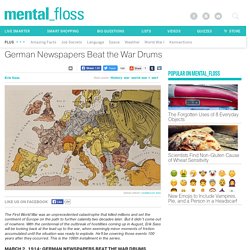
But it didn’t come out of nowhere. With the centennial of the outbreak of hostilities coming up in August, Erik Sass will be looking back at the lead-up to the war, when seemingly minor moments of friction accumulated until the situation was ready to explode. He'll be covering those events 100 years after they occurred. BBC Schools - World War One. World War One on TV and Radio. The Causes of World War One. June 28 in Sarajevo We'll start with the facts and work back: it may make it all the easier to understand how World War One actually happened.
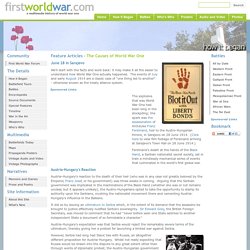
The events of July and early August 1914 are a classic case of "one thing led to another" - otherwise known as the treaty alliance system. 14 Reasons World War I Happened (And Four Things That Could Have Stopped It) For the past few years, Erik Sass has been covering the events that led to World War I exactly 100 years later.
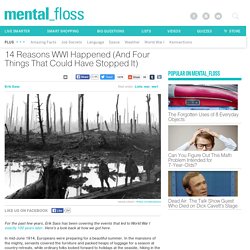
Here's a look back at how we got here. In mid-June 1914, Europeans were preparing for a beautiful summer. What if Archduke Franz Ferdinand had lived in 1914? Image copyright Getty Images World War One was a tragedy with particularly Austrian roots, sparked by the assassination of the heir to the throne, Archduke Franz Ferdinand in Sarajevo in 1914.
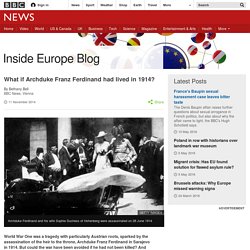
But could the war have been avoided if he had not been killed? And would the Austro-Hungarian Empire have survived? Those are the questions that have been posed at a conference at the Diplomatic Academy in Vienna, which has been training diplomats since 1754. How Nicky and Willy could have prevented World War I. Graham Allison is director of the Belfer Center for Science and International Affairs at Harvard’s Kennedy School.

One hundred years ago this week, Tsar Nicholas II of Russia and Kaiser Wilhelm of Germany exchanged a series of telegrams to try to stop the rush to a war that neither of them wanted. They signed their notes “Nicky” and “Willy.” Cousins who vacationed together, hunted together and enjoyed dressing up in the uniforms of each other’s military officers when sailing on their yachts, these two great-great-grandsons of Paul I of Russia wrote to each other in English, affirming their mutual interests and outlining an agreement that would have resolved the crisis on terms acceptable to both rulers.
Outbreak of World War I - World War I. Almost exactly a century before, a meeting of the European states at the Congress of Vienna had established an international order and balance of power that lasted for almost a century.
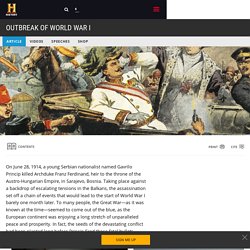
By 1914, however, a multitude of forces were threatening to tear it apart. The Balkan Peninsula, in southeastern Europe, was a particularly tumultuous region: Formerly under the control of the Ottoman Empire, its status was uncertain by the late 1800s, as the weakened Turks continued their slow withdrawal from Europe. Order in the region depended on the cooperation of two competing powers, Russia and Austria-Hungary. The slumping Austria-Hungary–in which small minorities (Germans in Austria, Magyars in Hungary) attempted to control large populations of restless Slavs–worried for its future as a great power, and in 1908 it annexed the twin Balkan provinces of Bosnia-Herzogovina. GCSE Bitesize: Four underlying causes of war. The debate on the origins of World War One - The British Library. HistoryNet. Facts, information and articles about World War I, aka The Great War World War I Facts Dates July 28, 1914 – November 11, 1918 Location.
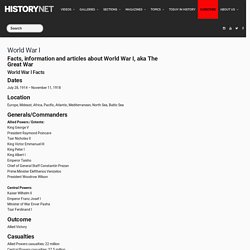
A Fire Waiting to be Lit: The Origins of World War I. Main Article A Fire Waiting to Be Lit: The Origins of World War I The assassination of Archduke Ferdinand and his wife,Sophie, as depicted in a drawingon the front page of a 1914 Italian newspaper.
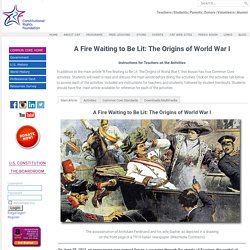
(Wikimedia Commons) Germany and Austria started WWI seeking European domination, historian says. “The causes of the First World War are very complicated and broad,” explained Sir Max, whose book 1914: Europe’s Tragedy is to be released later this year.
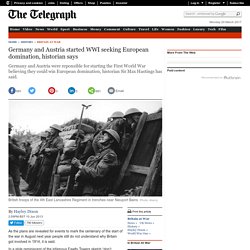
“But the truth is that Austria and Germany bear the chief responsibility. They believed that they could win a war which would give them European domination. “Nobody wants to say it as they don’t want to upset the Germans. We mustn’t over simplify it too much, it was a complex background, but Britain did not want a war and the Germans did.” Assassination of Franz Ferdinand - A Cause of WWI. Gavrilo Princip tries to commit suicide, after his fatal shooting of the Archduke and his wife, but the cyanide in the capsule he swallows is old, hence ineffective. He remains unbowed, insisting he is a Serbian patriot. Just under the legal age to hang, he is sentenced to life in prison and dies of tuberculosis, four years later. The single bullet he used to kill Franz Ferdinand starts the first world war.
Alliances between nations, as depicted in this video, pull other countries into a disastrous conflict. FC126: The Causes and Outbreak of World War I. Yes, this delightful land which we inhabit and which nature caresses with love is made to be the domain of liberty and happiness...I am French, I am one of thy representatives!... Oh, sublime people! Accept the sacrifices of my whole being. Happy is the man who is born in your midst; happier is he who can die for your happiness. — Robespierre France will have but one thought, to reconstitute her forces, gather her energy, nourish her sacred anger, raise her young generation to form an army of the whole people, to work without cease, to study the methods and skills of our enemies, to become again a great France, the France of 1792, the France of an idea with a sword. War Resistance Anti-Militarism and Deportation.
Though she was not a pacifist, Emma Goldman insisted on the anarchist principle that the state has no right to make war. She believed that most modern wars were fought on behalf of capitalists at the expense of the working class, and that the draft was a form of illegitimate coercion. As the United States appeared to be drifting toward war in late 1916, Goldman threw her energy into opposing the government's military preparations, using her magazine, Mother Earth, as a forum. Goldman was not alone in this cause: the antiwar effort was the product of a broad coalition of liberals, socialists, anarchists, and progressive unionists. Ultimately, however, the federal government crushed this movement and repressed its elements in an almost hysterical patriotic prowar and antiradical crusade orchestrated by President Woodrow Wilson.
Propaganda for patriotism and nationalism - The British Library. Nationalism and the lessons of World War I, 100 years on. The human genius for turning small differences into big wars was never more apparent than 100 years ago this week. The world was on the verge of a slaughter that took 17 million military and civilian lives. The causes were a suicide attack on an archduke, followed by a series of casual decisions by various leading powers to allow treaties and alliances to fall into place like the tumblers on a lock, opening the gates of hell.
A century later, what have we learned? A lot, in fact. Whether we know it or not. The first truth is that the leading powers of the day must be cautious about pulling themselves and their allies into escalating conflicts. Propaganda - The British Library. What You Need To Know About the Start of WWI. June 28 is the 100th anniversary of the assassination of Archduke Franz Ferdinand of Austria and his wife, Sophie, in Sarajevo. Though this event in 1914 is often seen as the catalyst that ultimately started the first World War, there’s a little more to it than that. Causes of WWI: Nationalism, Militarism and Imperialism: Franco-Prussian War (1870-71): Basically, the purpose of this war was to unite Germany and all of its territories under control of Prussia. The French feared a German-Spanish alliance would form and decided to get involved.
Germany won, Napoleon III was captured, Paris rebelled and German troops occupied France. Germany and Russia don’t renew friendship treaty (1894): Subsequently, their relationship goes down the drain and a rivalry between Germany (Central Power) and Russia (Allied Power) is born. Russo-Japanese War (1904-05): Russian and Japan had been arguing over Manchuria (Where is that, you ask? Why did Princip do it? Gavrilo Princip was Serbian. National World War I Museum : Online Collections.
National World War I Museum and Memorial. U.S. Entered World War I. National World War I Museum and Memorial. History, Travel, Arts, Science, People, Places. The US in World War I Video - World War I History. My TV provider is not listed. Why not? We are currently working on adding more TV providers. Please check back frequently to see if your TV provider has been added. Why do I need to log in to watch some video content? Brief History of DOL - Start-up of the Department and World War I, 1913-1921.
America in the First World War. "In Flanders fields the poppies blow/ Between the crosses, row on row... " America enters World War I - Apr 06, 1917. Also on this day Lead Story. Khanacademy. Log In - New York Times. SONGS OF WORLD WAR I. PBS - American Experience: Woodrow Wilson. For years President Woodrow Wilson had proclaimed the virtues of American neutrality. Consequently, in 1917, he faced a dilemma - how to convince the public that American intervention in Europe was now necessary. His solution, less than a week after the United States declared war on Germany, was to assemble a Committee on Public Information.
The CPI's sole mission was to gain popular support for America's entry into war. Wilson picked George Creel, a muckraking journalist from Missouri, to head the organization. World War I. Digital History. Printable Version President Wilson was reluctant to enter World War I. When the War began, Wilson declared U.S. neutrality and demanded that the belligerents respect American rights as a neutral party. He hesitated to embroil the United States in the conflict, with good reason. "These Deeply Momentous Things": United States Intervention into World War I. [This is the first post in a series. see Part Two and Part Three.] With 2017 now upon us, we are moving toward the hundredth anniversary of direct American intervention into the Great War in April 1917. America in the Great War. Free speech, world war one, and the problem of dissent. World War I and the American Red Cross.
Woodrow Wilson: Foreign Affairs. World War I Medal of Honor Recipients for the United States Army. ‘I won’t eat no more ice cream’ and other propaganda posters of WWI. Over Here: WWI and the Fight for the American Mind. About this Collection - Newspaper Pictorials: World War I Rotogravures, 1914-1919. Historian Jay Winter: The five things Americans should know about the Great War. The Zimmermann Telegram and American Entry into World War I. The Great War: Evaluating the Treaty of Versailles. Log In - New York Times. U.S. Senate: The Treaty of Versailles. Treaty of Versailles and President Wilson, 1919 and 1921. World War I Ended With the Treaty of Versailles. Treaty of Versailles: The War Guilt Clause. The Versailles Treaty June 28, 1919. Treaty of Versailles. Treaty of Versailles, 1919. Treaty of Versailles - World War I. 3 important lessons learned from World War I. World War I: Aftermath. History - World Wars: The Ending of World War One, and the Legacy of Peace.
If Germany Had Won World War 1... A History of the First World War in 100 Moments: White feather for winner of Victoria Cross. Home - World War I Centennial 1914-1918 - SJSU Research Guides at San José State University Library. Vintage Audio - 1918. Articles - The British Library. World War I: War of Images, Images of War. A Russian revelation: where the mythical Cossacks of WW1 were really from. World War I soldier’s room untouched for almost 100 years. How Germany lost the WWI arms race. Combat and the soldier's experience in World War One - The British Library. Life as a soldier - The British Library. The Forgotten Armies of the Western Front – 1914 to 1918. The 'lost' poetry of World War One. World War One: The risks for women on the home front. British 'angels' who braved WW1 trenches. The First World War - History. Canada and the First World War. The Hidden World of the Great War.
iWonder - World War One: The global conflict that defined a century. First World War. First World War – The National Archives. World War I History - World War I. Facts & History. BBC iWonder - Was World War One propaganda the birth of spin?